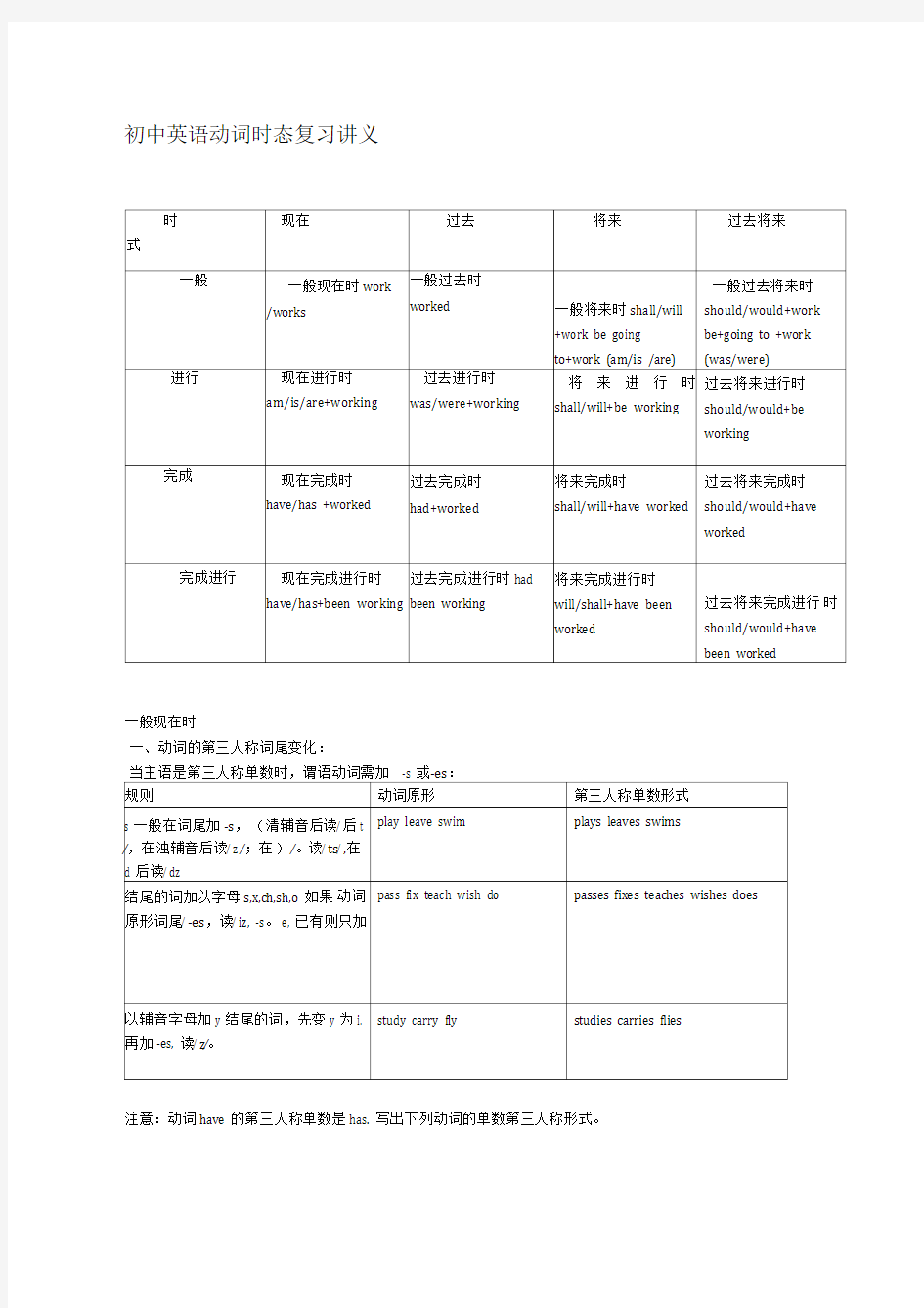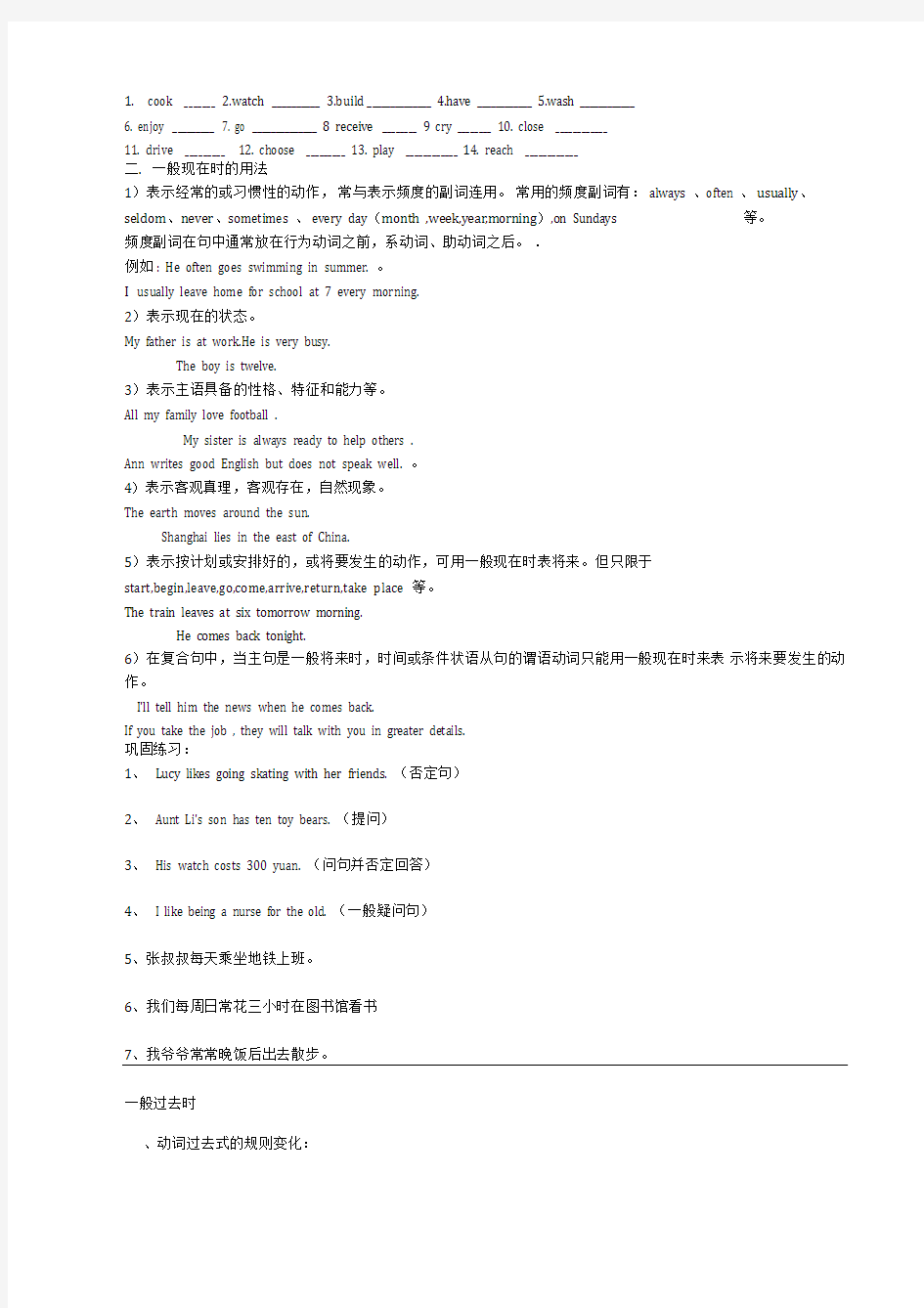

初中英语动词时态复习讲义
一般现在时
一、动词的第三人称词尾变化:
注意:动词have 的第三人称单数是has. 写出下列动词的单数第三人称形式。
1.cook _______
2.watch __________
3.build ______________
4.have ____________
5.wash ____________
6. enjoy _________
7. go ______________ 8 receive ________ 9 cry ________ 10. close ____________
11. drive _________ 12. choose _________ 13. play ____________ 14. reach ____________
二.一般现在时的用法
1)表示经常的或习惯性的动作,常与表示频度的副词连用。常用的频度副词有:always 、often 、usually、seldom、never、sometimes 、every day(month ,week,year,morning),on Sundays 等。
频度副词在句中通常放在行为动词之前,系动词、助动词之后。.
例如: He often goes swimming in summer. 。
I usually leave home for school at 7 every morning.
2)表示现在的状态。
My father is at work.He is very busy.
The boy is twelve.
3)表示主语具备的性格、特征和能力等。
All my family love football .
My sister is always ready to help others .
Ann writes good English but does not speak well. 。
4)表示客观真理,客观存在,自然现象。
The earth moves around the sun.
Shanghai lies in the east of China.
5)表示按计划或安排好的,或将要发生的动作,可用一般现在时表将来。但只限于
start,begin,leave,go,come,arrive,return,take place 等。
The train leaves at six tomorrow morning.
He comes back tonight.
6)在复合句中,当主句是一般将来时,时间或条件状语从句的谓语动词只能用一般现在时来表示将来要发生的动作。
I'll tell him the news when he comes back.
If you take the job , they will talk with you in greater details.
巩固练习:
1、Lucy likes going skating with her friends. (否定句)
2、Aunt Li's son has ten toy bears. (提问)
3、His watch costs 300 yuan. (问句并否定回答)
4、I like being a nurse for the old. (一般疑问句)
5、张叔叔每天乘坐地铁上班。
6、我们每周日常花三小时在图书馆看书
7、我爷爷常常晚饭后出去散步。
一般过去时
、动词过去式的规则变化:
cry cries 写出下列动词的过去式形式。
1.put ___________
2. drink _________
3. cry __________
4. pull __________
5. ride _____________
6.begin ____________
7. sit ___________
8. run _____________
9. take _____________ 10.sweep __________
11. stop _________ 12. solve __________ 13. rob ______________ 14. wait __________ 15. lie ______________
16. turn _________ 17. explore __________ 18. drop _________ 19. clean _________ 20. produce _______
21.get ______________ https://www.doczj.com/doc/ce2977321.html,ugh ____________ 23.pay ____________ 24.die _____________ 25.prefer _______
二. 一般过去时的用法
1)表示过去某个时间所发生的动作或存在的状态。常和表示过去的时间状语yesterday, last week, an
hour ago,just now, the other day, in 1982 ,once upon a time,the day before yesterday 等连用。在一般过去式中,要表达“过多少时间之后” ,一般用after 。几年后。
例如:Where did you go just now? 刚才你上哪儿去了?
After a few years,she started to play the piano. 几年后,她开始弹钢琴。
2)表示在过去,经常或反复发生的动作。常与often,always 等表示频度的副词连用。例如:When I was a child, I often played football in the street. 我是个孩子的时候,常在马路上踢足球。
3)一般过去式也可与today,this week,this month,this year 等表现在的时间壮语连用,但这些时间壮语须指过去的时间,决不包含“现在” “此时此刻”的意思。
例如:Did you see him today? 今天你看见他了吗?巩固练习:
1、Yesterday I went swimming.(改写成否定句。)
2、He was born in Shanghai.(对划线部分提问)
3 我昨天买了一辆新自行车。
4、我前天读了一本书。
一般将来时
一、一般将来时的构成:助动词will+ 动词原形
在口语中,will 在名词或代词后常缩为'll ,wii not 常简缩为won't 。在疑问句中,主语为第一人称时(I 和we)时,常用助动词shall 。
例如:She'll go to play basketball. 她要去打篮球。
Shall we go to the zoo? 我们要去动物园吗?
二、一般将来时的用法
1、表示将来某个时间要发生的动作或存在的状态,常与tomorrow, next year,soon , in the future,in
+ 段时间,in+2080 等连用。例如:I'll meet you at the school gate tomorrow morning.
2、表示将来经常或反复发生的动作。
例如:I'll come and see you every Saturday next year. 明年我将每个星期六来看你。
3、表示说话人对于将来的看法、假设和推测,通常用be afraid,be/feel sure,hope,know,think 等后
面的从句或与副词perhaps,possibly,maybe 等连用。
例如:I think she'll go back home for supper. 我想她会回家吃饭。
Maybe she'll go to the gym. 也许她会去体育馆。
三、be going to + 不定式,表示将来。
1、表示主语进行某一行动的打算意图。这种打算常经过预先考虑并含有自己做好某些准备的意思。即计划,安排要发生的事。
例如:What are you going to do tomorrow? 明天打算作什么呢?The play is going to be produced next month 。这出戏下月开播。
、表示说话人确信如此或有某种迹象表明某事即将发生。2.
例如:Look at the dark clouds, there is going to be a storm. 看那乌云,快要下雨了。
3、注意:be going to 和will 之间的区别。
1 两者都用于预测时,be going to 意指有迹象表明某件事将要发生,属客观的推测;will 则意指说○话人认为/相信某件事将要发生,属主观的推测。
2两者在时间的发生上,be going to 通常表示马上要发生或相当快就要发生的事情;而will 不指明○任何具体时间,可以指遥远的未来。
例如:He is gong in to be better. 他的病就要好起来了。
He will be better. 他的病会好起来了。
3两者都表示意图时,be going to 含有预先计划、准备的意思;will 则指未经过预先思考或计划,○是临时的一种决定。
4在条件状语从句中,be going to 表将来,will 表意愿。○例如:If you are going to make a journey, you'd better get ready for it as soon as possible.
如果你将要去旅行,最好尽快做好准备。
Miss Gao will tell you the answer if you ask her. 如果你去问高老师,她会告诉你答案。
四、be + 不定式表将来,表示客观安排或受人指示而将要做某事。例如:We are to discuss the report next Saturday. 我们下星期六讨论这份报告。
五、be about to + 不定式,意为马上做某事。不能与tomorrow, next week 等表示明确将来时的时
间状语连用。
例如:He is about to leave for Beijing. 他马上要去北京。巩固练习:
1.Mrs. Brown is going to buy a digital camera. (对划线部分提问)
2.My boss is going to fly to London on business the day after tomorrow. (用often 改写句子)
3.Sam will visit Brazil next week. (变成一般疑问句并否定回答)
4.他们今晚要去看足球赛。
5.金一家人什么时候去长城啊?
过去将来时
一、过去将来时的构成:1、would/should+ 动词原形
2、was/were going to+ 动词原形
二、过去将来时的用法:
1、表示从过去某时看将要发生的动作或存在的状态。常用于主句是一般过去时的宾语从句中例如:He said that he would finish his work before 9 o'clock.
他说他会在九点之前完成工作。
2、表示过去的某种习惯,只要would 。
例如:Whenever he has been in trouble,we would give him a hand. 每当他遇到困难时,我们总会伸出援助之手。
巩固练习:
1、He said that he (come)back tonight.
2、I thought it ( rain ) soon.
现在进行时
、现在进行时的构成:am/is/are+ 动词的现在分词的构成形式V-ing 二、动词
写出下列动词的现在分词形式。
1、win
2、relax
3、jump 4 、make
5、have
6、talk
7、tie 8 、cheer
9、enjoy 10、cry 11、come 12、fit
三、现在进行时的用法:
1、表示现在(指说话人说话时)正在发生或进行的动作。常与now,right now,at this moment 等时间壮语连用。
例如:We are waiting for you now. 我们正在等你。
2、表示现阶段(说话前后一段时间内) ,一直在进行的活动。说话时动作未必正在进行。例如:Mr. Green is writing another novel. 他在写另一部小说。 (说话时并未在写,只处于写作的状态。)
He is thinking about this problem. 这些天来他一直在考虑这个问题。
3、表示反复发生的动作或持续存在的状态,常与always, constantly, forever 等词连用,往往带
有说话人的主观色彩。
例如:You are always changing your mind. 你老是改变主意。
4、表示渐变,这样的动词有:get, grow, become, turn, run, go, begin 等。例如:The leaves are turning red. 叶子在变红。
It's getting warmer and warmer. 天越来越热了。
5、表示按计划或安排要发生的动作。
1 表移动的终止性动词 ( come, go, arrive, leave, start, begin, return 等) 用于现在进行时,表示即将要○发生动作。例如:I'm leaving tomorrow. 明天我要走了。
The train is arriving soon. 火车要到了。
2 一些持续性动词用于进行时,表将来,表示说话者对对方将要做的事情的一种关心。○例如:Are you staying here till next week? 你会在这儿呆到下周吗?注意:表示感情的动词,like
dislike ,hate,love,fear,want,wish,prefer,rufuse,forgive 等,一般常用现在时代替现在进行时。
巩固练习:
1、Bruce often writes letters in English. (用now 改写句子)
2、They are surfing. (对划线部分提问)
3、瞧,那些孩子们玩的真高兴!
4、这些天工人们一直在尽力修补那些坏了的帐篷。
用所给动词的正确形式填空。
1. Uncle Wang usually ___________ (go) to work by bike.
2.Be quiet ! The patient _________________ (sleep).
3、Look, a number of Young Pioneers _____________________ (plant) trees over there.
4、Emily often ________ (help) her mother ____________ (wash) clothes on Sunday.
5、______ (not be) afraid, I __________________ (show) you how to reach the station.
6、What _______ you ____________________ (do) the day after tomorrow ?
7、There ___________ (be) an important meeting in two days.
8、My aunt (join) the Party in 1995.
过去进行时
一、过去进行时的构成:was/were+ 动词的现在分词(-- ing) 二、过去进行时的用法:
1、表示在过去某时刻正在进行或发生的动作,通常与表过去的时间壮语连用如this time yesterday,at
10 o'clock yesterday,then, at that time, at that moment, when the teacher came in,from 8:00 to 10:00 yesterday,the whole morning, during the summer of 2012,when/while I was doing my homework 。
例如:At this moment yesterday, I was packing for camp.
昨天这个时候,我正在收拾东西去露营。
2、表移动的动词,如come, go, arrive, leave, start, begin, return 等词的过去进行时,可以表示过去将要发生的动